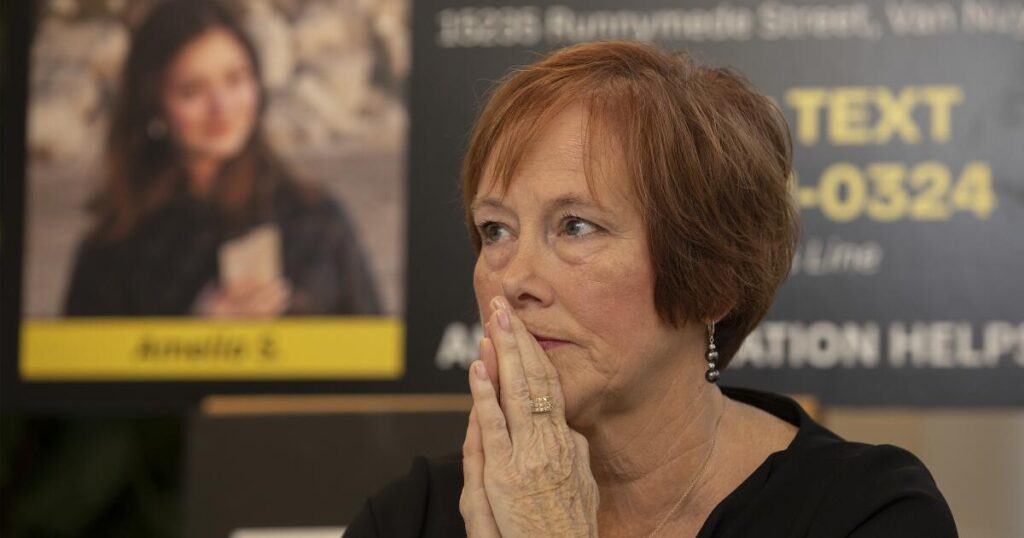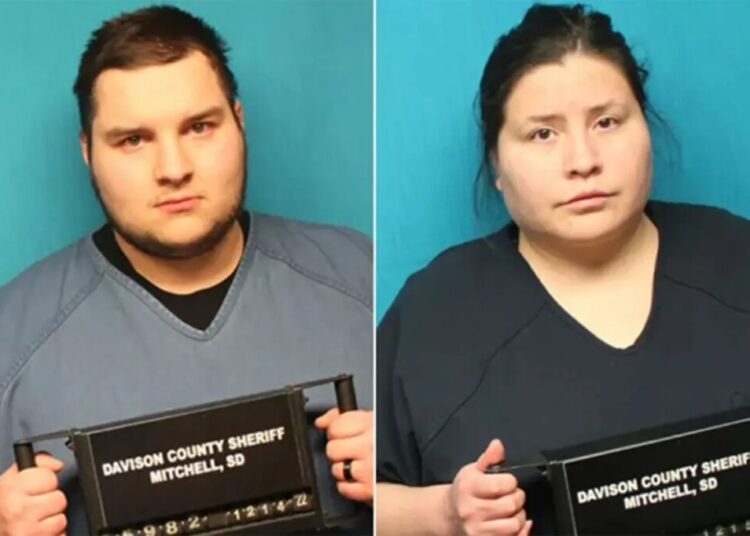When Amelia Salehpour walked away from an Orange County drug treatment facility, her parents turned to the police for help. She was in danger — they were sure of it.
The 18-year-old checked herself out of Saddleback Recovery in Costa Mesa on a summer day in 2023, and hopped into a car with her ex-boyfriend and a man he called “Raider.” Together, they drove up to the San Fernando Valley.
After tracking his daughter down to what a prosecutor later called a “house of horrors” in Van Nuys, Ali Salehpour decided to call 911. Amelia, he said, struggled with mental illness and had the cognitive abilities of an eighth-grader, which made her vulnerable to manipulation. Her family pleaded for officers to come check on her.
The first cops arrived hours later. They knocked on a side gate and left after getting no response.
The next day, after more prodding by Amelia’s father, police received permission to search some parts of the house but found no sign of her. Then, less than 24 hours later, someone inside the house called police to report a death. Officers found Amelia in a garage, next to syringes and a burned spoon with a sticky black substance.
The first LAPD investigators on scene ruled it an open-and-shut case of accidental overdose. The medical examiner’s office agreed, deciding against a more thorough autopsy.
But the family was unconvinced.
They hired a high-end investigative firm that said it uncovered evidence that Amelia was being groomed for sex work and that her death had only been made look like an overdose. A private autopsy paid for by the family found signs of strangulation.
The contradictory findings have since triggered a bitter conflict within local law enforcement. On one side are LAPD homicide detectives and some within the L.A. County district attorney’s office who maintain the original ruling of an overdose was correct.
Salehpour and his wife, Sue, maintain she was killed — and they are not alone.
Earlier this year, a deputy district attorney filed criminal charges — which have since been dropped — against seven people based on evidence gathered by the family’s investigators and a pair of LAPD narcotics detectives.
Defense attorneys for the suspects have accused the Salehpours of being a rich family so blinded by the grief at losing their young daughter that they effectively bought a prosecution.
Amelia’s father is retired after helping build Applied Materials Inc., the country’s biggest supplier of equipment used to make microchips, into the $6-billion company that it is today.
Her parents said they are only doing what any parent would do in search of justice for their child — if they had the money.
Ali Salehpour said his goal from the family’s litigation is not a payout from the city.
“I’m not in this for the money,” he said. “I need [the LAPD] to do its job.”
Sue Salehpour’s voice still cracks and her eyes become watery when she talks about what happened to her daughter. Instead of admitting to their mishandling of the family’s initial pleas for help, the Police Department closed ranks and fought them at every step, she says.
“The LAPD let our daughter down, they let our daughter die in that house,” she said. “They made the decision that our daughter was a drug addict and mentally ill and they treated her that way.”
From an early age growing up in the Bay Area city of Saratoga, Amelia was always the center of attention — “exuberant, silly, joyful,” her mother recalled. Her parents started calling her their “supernova.”
They sought to nurture Amelia’s talents by putting her in piano, violin and singing lessons.
Dark-haired, with piercing eyes, Amelia tried to maintain a normal teenage life. When she wasn’t glued to her phone, she was rifling through the racks at thrift stores or ordering Hello Kitty memorabilia online. On one birthday, her father surprised her by flying her down to L.A. to see her favorite band, emo rockers My Chemical Romance, at SoFi Stadium.
But underneath her bright smile, she struggled with a range of medical and mental health issues, her parents said.
In her early teens, her parents say, she began showing signs of borderline personality disorder, attention deficit disorder and depression. The symptoms worsened as she dealt with the loss of a cousin and both of her grandmothers in the span of a few years.
She tried to take her own life several times, and after one attempt, in 2019, her family says she was committed to a mental health facility. Soon, she began using drugs to self-medicate, keeping her parents in a state of constant worry. Desperate for a solution, they checked her into Rising Roads Recovery, a $30,000-a-month, women-only in-patient mental health treatment center.
A few months before her death, Amelia’s parents dropped her off at the clinic in Costa Mesa. In the weeks that followed, they allege in a lawsuit against Rising Roads filed in L.A. County Superior Court, the staff repeatedly misled them about Amelia’s worsening condition.
Cut off from her family and friends, she began suffering panic attacks after being sexually assaulted by another patient, the family’s lawsuit says. They claim Amelia confided in staff members that she heard nightly voices in her head suggesting she kill herself or harm others.
The Salehpours contend they were kept in the dark when Amelia was transferred to a sister facility for substance abuse, Saddleback, after she was caught with a vape pen.
Despite her ongoing struggles, the family’s lawsuit says that Saddleback staff allowed Amelia to check herself out of the facility on July 22, 2023. Around 3:49 p.m. that day, she walked out with a suitcase of clothes, five weeks’ worth of medication — and no cellphone or ID.
Surveillance video showed her getting into a car and driving off, the family’s lawsuit says.
An attorney for Rising Roads responded to an inquiry about Amelia’s case with a statement that said the center was “deeply saddened by her passing.”
“These are tragic and profoundly unfortunate circumstances. Rising Roads denies the allegations made against it and its staff, and maintains that its team acted professionally and in full compliance with all applicable standards, policies, and legal obligations,” said Brian Hoffman, declining to comment further.
Saddleback said it generally denied the allegations made in the Salehpours’ suit.
After learning that she may have been taken to the Van Nuys area, Amelia’s uncle, Armin, drove around for hours before spotting her outside a liquor store off Sepulveda Boulevard, which police say is a known hub for sex work.
Amelia got into his car and they cruised around for a while, talking. He tried without success to convince her to go with him back down to San Pedro, where her grandmother lived. Eventually she asked him to drop her off at a run-down house with a tall white fence at 15235 Runnymede St.
They agreed to meet the following day so that he could buy her a new cellphone. They took a selfie together, and Amelia turned to wave as she walked through the front door, her uncle testified at a preliminary hearing earlier this year.
When she didn’t show up for their meeting the next day, her parents feared the worst.
Although the perception lingers that violent crime is rampant in Los Angeles, statistically speaking murder is less common that it has been in decades. Yet even with fewer killings to investigate, homicide “clearance rates,” a measure of how often cases are solved by police, remain steady.
Cases become cold. Witnesses refuse to step forward. Killers cover their tracks.
In rare cases, slayings go undetected by authorities or are misclassified. Unlike others who have lost loved ones under circumstances that are unclear or in dispute, the Salehpours had the resources to ensure no stone was left unturned.
After Amelia failed to show up for the meeting with her uncle, the family contacted Black Box, a private security company. The firm, whose founder Edan Yemini once served as a personal security guard for Britney Spears, employs former military specialists from the U.S. and Israel to serve as armed bodyguards.
Black Box’s director of investigations, John Romero, a retired LAPD captain, called 911 on the family’s behalf.
The Salehpours have paid the company more than $1 million over three years, according to testimony in court and filings by attorneys for some of the defendants. They also hired a pair of high-powered civil lawyers, Alan Jackson, a former L.A. County prosecutor, and Caleb Mason, a former federal prosecutor in San Diego, to handle their lawsuits.
Officers showed up and left after Romero’s 911 call, but Black Box agents kept up round-the-clock surveillance of the house. They saw people going in and out, carrying boxes out of the house onto a flatbed truck as though they were “sanitizing a crime scene,” the family’s lawsuit says.
Amelia’s father, who had flown down from Northern California, kept watch overnight outside from the back of his rental car.
Crucially, the family’s lawsuit claims, the police who arrived the following afternoon and got permission to look around did only a partial search of the house, failing to look inside a garage on the property after one of the residents asked them not to disturb a person who was sleeping.
That’s where Amelia was discovered the next day.
While the rest of the house was in disarray, the room where she was found was almost spotless. Her family told The Times that the scene — her body splayed on the floor next to an open drawer with needles and a burned spoon with black tar heroin residue — was so neatly arranged that to them it looked staged.
An investigator from the Los Angeles Medical Examiner’s office put her time of death at between 16 and 24 hours before the body was found — meaning she was likely still alive when LAPD officers were at the house the day before, the family’s lawsuit says.
But because no foul play was suspected, authorities were slow to collect and process key evidence at the scene, the family argued.
The private autopsy the family commissioned found other DNA on Amelia’s underwear and under her fingernails, as well as evidence of “severe sexual trauma.”
Unlike the medical examiner’s assessment — which found signs of “lividity,” a medical name for the pooling of blood that occurs if a body is moved after someone has died — the private exam theorized it was bruising from places where Amelia was struck with a blunt object while still alive.
Authorities later arranged for a cadaver dog to search the Runnymede house, which indicated the presence of human remains in the garage where Amelia’s body was found, as well as an adjacent shed. Inside, investigators discovered a fan belt hanging from the ceiling.
Suspecting Amelia may have been bound or strangled there, the family also sought out Dr. William Smock, a forensic medicine expert with the Louisville (Ky.) Police Department. Smock had testified as an expert on strangulation as a witness for the prosecution in the murder trial of former Minneapolis police officer Derek Chauvin.
His conclusion, according to records provided by the family: Amelia had died a violent death.
In the meantime, Black Box’s investigation had started to resemble a full-fledged homicide case. Its investigators, some of whom are former homicide detectives, started running the plates of vehicles that were photographed coming and going from the house. They pulled together profiles of the house’s occupants using information available from data brokers — building a history of the home that was so detailed that Black Box could tell “who’s received pizza there,” Romero told The Times.
The family’s probe began to focus on the man nicknamed “Raider” who accompanied Amelia and her ex-boyfriend, Nicholas Reyes, to the Valley the day she left the treatment center. His name was Marlon Mancillas, and an LAPD detective testified in court that he was a reputed Blythe Street gang member with a lengthy criminal past that included a 2019 conviction for aiding a murder suspect’s efforts to elude capture.
Black Box visited Mancillas in jail, where he was locked up on auto theft charges, and he agreed to speak to them in exchange for money. That Christmas, they put about $1,000 on his books.
Nubia Diaz, an attorney for Mancillas, said her client “has always maintained his innocence.”
In an interview with another resident of the Runnymede house, the private investigators said they learned something that the Salehpours had long feared: that the police’s visit on July 24 had so panicked the occupants of the home. that “Amelia became a liability and they decided to kill her,” the family said in its lawsuit against the LAPD.
The family went back to the authorities with their new evidence.
But rather than revisit the initial findings, the lawsuit filed by the Salehpours claims, the LAPD’s Valley homicide unit and the medical examiner’s office closed ranks and refused to budge.
Unbeknown to the Salehpours and Black Box, a pair of LAPD narcotics detectives, Alexander Tan and Jose Verdin, were also investigating the Runnymede house for drug trafficking.
Tan and Verdin arrested the ex-wife of one of the home’s residents and brought her in for questioning, hoping that she would help them break the case, according to court testimony. The woman, who was on parole, offered to give police information about the Runnymede house. She asked them if they knew about a “dead girl.”
Neither detective knew what she was talking about.
Verdin testified at a preliminary hearing earlier this year that he first learned of the family’s investigation a few months into his own probe of the Runnymede address — a known “flop house” where police had received more than 300 calls for service since 2017. Weeks before Amelia’s death, officers had responded there for a report of a man beating a woman with an aluminum bat.
The home was outfitted with a security system that allowed its occupants to monitor the home’s exterior, and young women were seen coming and going throughout the day, suggesting the possibility that they were trafficked, testified Verdin, a 30-year LAPD veteran who ran the Van Nuys drug squad. When police served a search warrant on the house in February, they found 26 assault-style rifles in one of the bedrooms, he said.
Verdin contended in a whistleblower government claim against the city that as he began to unearth evidence suggesting Amelia may have been killed, LAPD higher-ups set out to “systematically” dismantle the case. His claim says the department took the extraordinary step of requiring its own detectives to obtain a court order to get access to certain body camera footage.
The city has not yet responded to the detective’s claim, which is usually a precursor to a lawsuit.
At a meeting on Sept. 12 with his higher-ups, Verdin said in his claim that he suggested the case be turned over to the elite Robbery-Homicide Division. Instead, his claim alleges, he was told to “leave it alone.”
“We’re not helping the family sue us,” Verdin claims an LAPD official said.
Then, Verdin said his bosses moved his partner Tan out of narcotics without notice. And while Tan was assured that he would be given time to continue working on the case, he was soon buried with new assignments, according to Verdin’s claim.
The narcotics detectives had been in communication with Ranna Jahanshahi, a prosecutor in the L.A. County district attorney’s office. She found the evidence compelling enough to pursue charges of kidnapping and false imprisonment among others against seven defendants, including Amelia’s ex-boyfriend Reyes and the man he was driving with, Mancillas, aka “Raider.”
All of the defendants pleaded not guilty.
Dyke Huish, an attorney for Reyes, said his client faced charges even though he only dropped Amelia off in the Valley.
“This is ultimately about a young girl that passed away tragically, and parents who could not accept the reality of drug overdoses and hard living by a girl who had serious drug addictions,” he said. “I’m certain that they loved their daughter very much, but rather than accept the reality, they attempted to force it into a narrative that better suited what they wanted to believe about their daughter.”
Jahanshahi declined to comment in response to an inquiry from The Times. In an email to leadership at the D.A.’s office, she described facing resistance from colleagues along with police and medical examiners officials with whom she normally worked closely.
As she clashed with some in her office over the prosecution, her original co-counsel was suddenly reassigned. His replacement, Deputy Dist. Atty. Fred Engell, privately expressed his misgivings about the cases both to colleagues and defense attorneys.
At a hearing in mid-September, Jahanshahi lashed out at Engell in open court, accusing him of “going behind her back” and conspiring to get her removed from the case.
In her email to leaders at the D.A.’s office, Jahanshahi wrote that she had been dealing with the mental toll of fighting for justice while being constantly undermined. “I cannot take any more spoken or silently whispered backstabbing and bludgeoning of my character and identity,” she wrote in the message late last month.
Lawyers for the seven defendants have seized on the inter-office discord.
In a motion to remove Jahanshahi from the case, one defense attorney described her as a “rogue prosecutor” who had gotten emotionally entangled with the Salehpours and was leaking them discovery evidence to use in their civil case.
During a court hearing in downtown L.A. on Sept. 25, Superior Court Judge Charlene Olmedo said that she wouldn’t tolerate any game-playing by either side.
“I don’t know what’s going on in your office, I don’t know what’s going on in LAPD. I don’t know what is going on with this case,” a visibly frustrated Olmedo said to Jahanshahi.
Then, in late October, charges against all seven defendants were dropped with no public explanation from the D.A.’s office.
Mancillas’ attorney called the decision to dismiss the charges “the right one.”
“The evidence did not support the allegations against my client,” Diaz said. “We are grateful that the legal process ultimately reflected that.”
LAPD Deputy Chief Alan Hamilton, who oversaw the department’s Valley Bureau at the time of Amelia’s death, said that he was “more familiar with the case than I care to be.”
“I don’t have to tell you: Money and influence equals power,” he said in an interview before the charges were dismissed, adding he was limited in what he could say to avoid compromising what remained an ongoing criminal investigation.
The Salehpours told The Times they were invited to a meeting last week with Dist. Atty. Nathan Hochman and nearly two dozen senior members of his office, where Hochman told them that he believed that their daughter had been killed. But in order to pursue a murder case at this juncture, they said Hochman told them, it would be necessary to first drop the kidnapping and false imprisonment charges and continue to investigate further.
Keeping the lesser charges in place risked running afoul of state laws that forbid “double jeopardy” or prosecuting a defendant twice for the same alleged crime, the Salehpours said the D.A. explained.
Reluctantly, the Salehpours said, they accepted the decision to drop the charges.
According to the Salehpours, Hochman said he couldn’t make promises about any future charges but assured them that the case would be investigated by the major crimes unit, which handles the D.A.’s highest-profile and complex homicide cases. He also assured them that he would call LAPD Chief Jim McDonnell to ensure that their respective agencies were on the same page.
For Ali Salehpour, it felt somewhat vindicating to hear those words. Yet years of fighting to get police and prosecutors to take his claims seriously made him leery.
“I don’t know if he did that just to appease us. That’s my biggest fear,” Salehpour said. “Did he just say that to make us happy, and to shut us up?”
Times staff writer Richard Winton contributed to this report.
The post Authorities said she overdosed. Her parents spent millions in pursuit of murder charges appeared first on Los Angeles Times.




